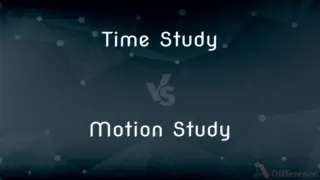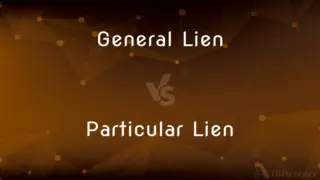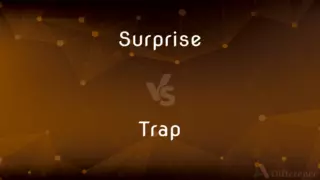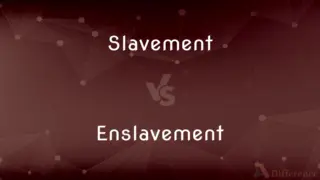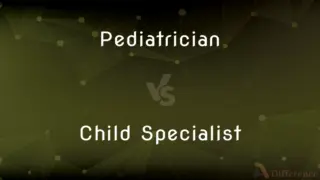Fainting vs. Seizure — What's the Difference?
Edited by Tayyaba Rehman — By Fiza Rafique — Published on October 9, 2023
Fainting vs. Seizure: Fainting is a brief loss of consciousness due to reduced blood flow to the brain, while a seizure involves abnormal electrical activity in the brain.
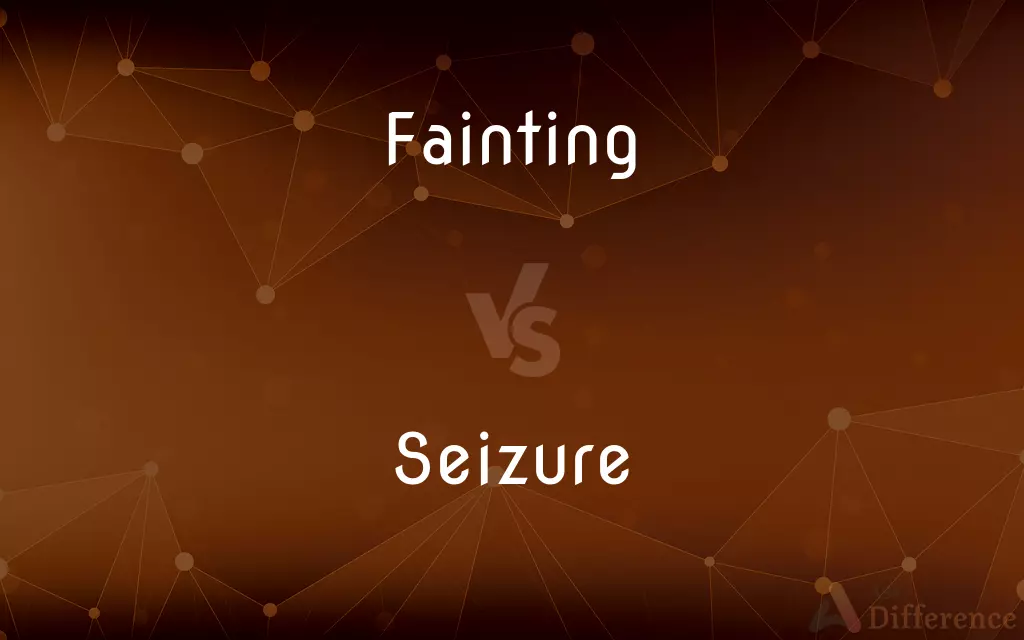
Difference Between Fainting and Seizure
Table of Contents
ADVERTISEMENT
Key Differences
Fainting episodes don't typically require treatment unless they are recurrent or due to an underlying condition. Seizures might require medical intervention, and chronic seizures might require ongoing medication or other treatments.
Fiza Rafique
Oct 09, 2023
Fainting, also known as syncope, is a sudden, temporary loss of consciousness that usually results in a fall. Seizure, on the other hand, refers to an uncontrolled electrical disturbance in the brain, which can produce various symptoms.
Fiza Rafique
Oct 09, 2023
During a fainting episode, a person might go limp and may fall down, but they usually regain consciousness quickly and spontaneously. In contrast, during a seizure, a person might experience muscle spasms, twitching, or even lose consciousness, and the duration can vary.
Fiza Rafique
Oct 09, 2023
While fainting can be concerning, especially if the cause is unknown, it is not usually associated with an ongoing condition. Seizures, especially if recurrent, can indicate a more chronic condition like epilepsy and might require long-term management.
Fiza Rafique
Oct 09, 2023
The causes of fainting are generally related to a decrease in blood supply to the brain, such as standing up too quickly or being dehydrated. Seizures can be triggered by numerous factors, including epilepsy, high fevers, or certain medications.
Fiza Rafique
Oct 09, 2023
ADVERTISEMENT
Comparison Chart
Definition
Temporary loss of consciousness due to reduced blood flow
Uncontrolled electrical disturbance in the brain
Fiza Rafique
Oct 09, 2023
Typical Causes
Reduced blood flow to the brain
Epilepsy, fever, certain medications
Fiza Rafique
Oct 09, 2023
Common Symptoms
Limpness, falling
Muscle spasms, twitching, possible loss of consciousness
Fiza Rafique
Oct 09, 2023
Duration
Brief, usually seconds to a minute
Can vary, from brief to several minutes
Fiza Rafique
Oct 09, 2023
Treatment
Usually none, unless recurrent
Medication, lifestyle changes, surgery in certain cases
Fiza Rafique
Oct 09, 2023
ADVERTISEMENT
Definitions
Fainting
Temporary blackout due to decreased blood flow to the brain.
The hot weather contributed to his fainting.
Fiza Rafique
Sep 27, 2023
Seizure
An uncontrolled response to brain disturbances.
High fever in children can lead to a febrile seizure.
Fiza Rafique
Sep 27, 2023
Fainting
A momentary episode of unresponsiveness.
After fainting, she quickly recovered and felt fine.
Fiza Rafique
Sep 27, 2023
Seizure
A sudden surge of electrical activity in the brain.
Epilepsy is characterized by recurrent seizures.
Fiza Rafique
Sep 27, 2023
Fainting
A sudden, brief loss of consciousness.
She felt dizzy before fainting at the sight of blood.
Fiza Rafique
Sep 27, 2023
Seizure
An episode resulting from brain dysfunction.
She experienced her first seizure at the age of ten.
Fiza Rafique
Sep 27, 2023
Seizure
A convulsion or sudden change in behavior.
During a seizure, he began to twitch uncontrollably.
Fiza Rafique
Sep 27, 2023
Fainting
Done with little strength or vigor; feeble
A faint attempt to apologize.
Fiza Rafique
Sep 17, 2021
Seizure
A transient neurological event due to abnormal brain activity.
The bright flashing lights triggered a seizure.
Fiza Rafique
Sep 27, 2023
Fainting
So weak as to be difficult to perceive; a faint light in the distance; a faint echo.
Fiza Rafique
Sep 17, 2021
Seizure
A seizure, formally known as an epileptic seizure, is a period of symptoms due to abnormally excessive or synchronous neuronal activity in the brain. Outward effects vary from uncontrolled shaking movements involving much of the body with loss of consciousness (tonic-clonic seizure), to shaking movements involving only part of the body with variable levels of consciousness (focal seizure), to a subtle momentary loss of awareness (absence seizure).
Fiza Rafique
Sep 17, 2021
Seizure
A sudden attack, spasm, or convulsion, as in epilepsy or another disorder.
Fiza Rafique
Sep 17, 2021
Fainting
Lacking conviction, boldness, or courage; timid
A tourist who is faint at heart.
Fiza Rafique
Sep 17, 2021
Seizure
The act of taking possession, as by force or right of law.
The seizure of a thief, a property, a throne, etc.
The search warrant permitted the seizure of evidence.
Fiza Rafique
Sep 17, 2021
Seizure
A sudden attack or convulsion, (e.g. an epileptic seizure).
He fell to the floor and convulsed when the epileptic seizure occurred.
Fiza Rafique
Sep 17, 2021
Fainting
An abrupt, usually brief loss of consciousness, generally associated with failure of normal blood circulation.
Fiza Rafique
Sep 17, 2021
Seizure
A sudden onset of pain or emotion.
He felt the sudden seizure of pain as the heart attack began.
Fiza Rafique
Sep 17, 2021
Seizure
That which is seized, or taken possession of; a thing laid hold of, or possessed.
Fiza Rafique
Sep 17, 2021
Seizure
(obsolete) Retention within one's grasp or power; possession; ownership.
Fiza Rafique
Sep 17, 2021
Seizure
The act of seizing, or the state of being seized; sudden and violent grasp or gripe; a taking into possession; as, the seizure of a thief, a property, a throne, etc.
Fiza Rafique
Sep 17, 2021
Fainting
Syncope, or loss of consciousness owing to a sudden arrest of the blood supply to the brain, the face becoming pallid, the respiration feeble, and the heat's beat weak.
Fiza Rafique
Sep 17, 2021
Seizure
Retention within one's grasp or power; hold; possession; ownership.
Make o'er thy honor by a deed of trust,And give me seizure of the mighty wealth.
Fiza Rafique
Sep 17, 2021
Fainting
A brief cessation of consciousness and posture.
The shock caused a fainting spell.
Fiza Rafique
Sep 27, 2023
Seizure
That which is seized, or taken possession of; a thing laid hold of, or possessed.
Fiza Rafique
Sep 17, 2021
Seizure
A sudden occurrence (or recurrence) of a disease;
He suffered an epileptic seizure
Fiza Rafique
Sep 17, 2021
FAQs
Can "Fainting" be used as a verb?
Yes, "to faint" means to lose consciousness momentarily.
Fiza Rafique
Oct 09, 2023
Can someone have both a seizure and fainting episode simultaneously?
While rare, certain types of seizures can lead to decreased blood flow to the brain, causing fainting.
Fiza Rafique
Oct 09, 2023
What is the origin of the word "Fainting"?
"Fainting" originates from the Old French word "faintir," meaning to lose strength or become weak.
Fiza Rafique
Oct 09, 2023
Is "Seizure" always related to medical conditions?
No, "seizure" can also mean the act of taking possession, as in "the seizure of property."
Fiza Rafique
Oct 09, 2023
How can you differentiate between someone fainting and having a seizure?
Observing symptoms like muscle spasms or twitching can suggest a seizure, while a simple loss of consciousness with a quick recovery may indicate fainting.
Fiza Rafique
Oct 09, 2023
Are seizures always dangerous?
Not always, but they can be. It's essential to consult with a healthcare professional about any seizure activity.
Fiza Rafique
Oct 09, 2023
What should you do if someone is fainting?
Lay the person down, elevate their feet, and ensure they have a clear airway. Seek medical attention if necessary.
Fiza Rafique
Oct 09, 2023
Are "Fainting" and "Seizure" synonyms?
No, while both can involve loss of consciousness, their causes and manifestations differ.
Fiza Rafique
Oct 09, 2023
Can emotional distress cause fainting?
Yes, strong emotional reactions can trigger a fainting episode in some individuals.
Fiza Rafique
Oct 09, 2023
Is fainting always harmless?
Not necessarily. While many fainting episodes are benign, some could indicate a serious underlying condition.
Fiza Rafique
Oct 09, 2023
How are seizures diagnosed?
Seizures are often diagnosed through medical history, observation, and tests like EEGs.
Fiza Rafique
Oct 09, 2023
Are there different types of seizures?
Yes, there are various types, including absence seizures, tonic-clonic seizures, and focal seizures.
Fiza Rafique
Oct 09, 2023
What's a common cause of fainting in young people?
A common cause in young individuals is vasovagal syncope, often triggered by pain, stress, or standing for long periods.
Fiza Rafique
Oct 09, 2023
Can dehydration lead to fainting?
Yes, dehydration can reduce blood volume, leading to decreased blood flow to the brain and fainting.
Fiza Rafique
Oct 09, 2023
What should you do if someone is having a seizure?
Stay calm, prevent injury by moving nearby objects, and ensure the person's head is protected. After the seizure, help the person rest on their side and seek medical attention if needed.
Fiza Rafique
Oct 09, 2023
Author Spotlight

Written by
Fiza RafiqueFiza Rafique is a skilled content editor at AskDifference.com, where she meticulously refines and enhances written pieces. Drawing from her vast editorial expertise, Fiza ensures clarity, accuracy, and precision in every article. Passionate about language, she continually seeks to elevate the quality of content for readers worldwide.

Edited by
Tayyaba RehmanTayyaba Rehman is a distinguished writer, currently serving as a primary contributor to askdifference.com. As a researcher in semantics and etymology, Tayyaba's passion for the complexity of languages and their distinctions has found a perfect home on the platform. Tayyaba delves into the intricacies of language, distinguishing between commonly confused words and phrases, thereby providing clarity for readers worldwide.

